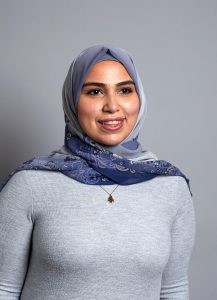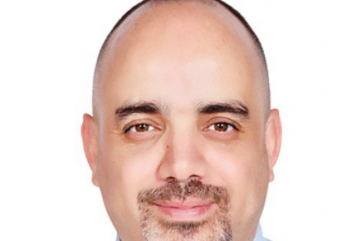SPOTLIGHT – Yasmine talks about navigating the intersection between Artificial Intelligence and Policing
Welcome to another Spotlight feature where we showcase research stories and shine a light on the people that make up the Industry and Innovation Research Institute (I2Ri). Alongside the BreakThru podcasts on spotify hosted by Marjory Da Costa-Abreu, we hope this will be a great way to celebrate our successes and get to know one another more.
This edition, we caught up with Yasmine Ezzeddine to find out a bit more about her and the work she does in I2Ri.

Please can you tell us a bit about yourself?
I am originally a Forensic Expert, I come from Lebanon where I studied an undergraduate degree in Forensic Sciences. After which I completed a Masters in Crime Sciences, Investigation, and Intelligence at the University of Portsmouth in 2017, and now I am pursuing a PhD at the Centre of Excellence in Terrorism, Resilience, Intelligence and Organised Crime Research (CENTRIC), Sheffield Hallam University (SHU) around Artificial Intelligence use in UK police forces. I am an Associate Lecturer for Hallam’s computing department; I am also the president of the Post Graduate Research (PGR) Society at SHU for 2023-2024.
“I aspire that my findings will serve as potential recommendations to assist the police in understanding why people resist to police surveillance and how that resistance is affecting the quality of the collected data, especially when relied upon in serious investigations."
What path led to your current work and working at Hallam?
To be honest, I was seeking a PhD opportunity at the time and this project sounded very interesting because of the intersection that it offers between policing, citizens’ perspectives, Artificial Intelligence, and security.
I have always been passionate about sciences and technology. My school was very encouraging of girls engaging in sciences and technologies, I recall we were forced to join tutorials on basic electronics and robotics at the time and so on. That, coupled with my personal passion for criminal investigations and policing, are probably what led to my current research involvement and work.
What is the most exciting thing about your work? What are some of the challenges?
The most exciting bit about this topic is that it is global, it is affecting everyone, and almost every citizen in every country has something to say about AI being used by police to monitor behaviours. Yet, citizen perspectives are not that different based on the research that we have done so far.
Another remarkable aspect of my research is understanding how people perceive AI tools being used by police, and the situational variation of behaviour and attitudes depending on specific scenarios. Also, after interviewing over 200 citizens now as part of 3 different studies, and in 8 different countries, the findings revealed and shared similar viewpoints across all the different countries.
In terms of challenges, juggling the different aspects of the PhD, working with multinational teams, managing expectations, and, balancing research work, teaching, mentoring, and personal and professional development can be quite challenging at times, but I find it equally rewarding.
Who or what inspired you to pursue your career?
As a young girl, I was inspired by crime novels and detective figures like Hercule Poirot and investigative movies such as The Bone Collector or CSI series, even Detective Konan, but I always wondered why there aren’t any more women figures. So, I thought to myself, ‘why not be one?’.
So, after becoming a crime scene investigator and a forensic expert, I became infatuated by the idea of digital technologies and their potential in the world of investigations. I first wanted to address the impact of AI use in police surveillance and if or how it affects people’s perceptions and behaviours in response.
I believe it is important to understand people’s reactions because those reactions are affecting the credibility of the collected data, whether online or on the streets, making surveillance data less reliable especially when used in criminal investigations.
Can you share a turning point or defining moment in your work as a researcher?
Well, this takes me back to a few years ago in Lebanon when I attended the Military Court for a job interview as a Forensic Expert and I was told that I will not be considered for the role simply because I am a woman and I wear a Hijab.
That was when I realised that I need to think outside the box, and not limit myself to certain biased standards, so I started applying for opportunities outside of Lebanon, which ultimately led me to be here today.
What advice would you give to someone who was looking to embark on a career in research?
I would say ‘Welcome Aboard’. Research is an ever-growing impactful environment, despite its challenges, it can be very rewarding since it allows for personal and professional development as well.
I would also recommend that they manage their expectations and train their lungs to have a good long breath because they’re going to need it!
Academic research requires patience and resilience, it is important to know that you won’t achieve things quickly, but when you do, it will be very rewarding. And if there is anything that I can assist with, please do not hesitate to reach out.
What do you most enjoy about your work (research and lecturing)?
My favourite aspect of my research is the fact that my topic is interdisciplinary which allows me to explore various fields and meet different people from different backgrounds, and discuss their various perspectives on the same topic, or variations of my topic in different aspects and from different lenses.
I also enjoy teaching because I believe it is a mutually beneficial experience, whereby I can share my knowledge and experience with my students, but I also learn and grow from their experiences and their research as well.
I first started teaching other fellow students when I was in high school and during my undergraduate years. And since I speak 5 languages (Arabic, English, French, Farsi and Turkish), I was involved in teaching foreign languages as well.
To me, teaching is one of the most influential careers that one can have, the impact of what you deliver is almost immediate and there is no greater joy for me than to see my students actually understand what I am explaining! And then watching them progress and develop into successful individuals in their communities.
What are your ambitions and the next steps for the research?
After asking citizens what they think about AI use in policing, I designed an experimental study where I asked participants to use their own Facebook account and perform a series of tasks online under presumed AI watch.
The final step is now to observe their behaviours offline, when informed of potential AI use in real-world surveillance, through the Privacy Walks study that we are currently conducting.
So, my next steps would be to complete data collection for my third study, analyse and write up those findings, and hopefully submit my thesis by the end of 2024 (Fingers Crossed!).
Is there an opportunity for colleagues to collaborate with you on your research?
As mentioned earlier, the interdisciplinary style of this project allows it to be perceived and approached differently by different people from various backgrounds.
We have already had a number of collaborations as part of this PhD, and I am more than happy to have some more, so please feel free to reach out if you are interested in any aspects of this research.
What real-world impact do you hope your research will make?
I believe that every research must have an impact, regardless of the size and dimension of that impact. In my case, I aspire that my findings will serve as potential recommendations to assist the police in understanding why people resist to police surveillance and how that resistance is affecting the quality of the collected data, especially when relied upon in serious investigations, to account for the concerns when developing and implementing AI tools in policing.
What path led to you leading the PGR Society?
This stemmed from my own personal experience when I first joined SHU as a PhD student during COVID, and the isolating experience that I had at the time.
Despite the UK being on the mend in 2021, remnants of self-isolation and social distancing made settling-in and building relationships quite difficult, and for an international student arriving at a different country with no support system, it was very challenging.
I have recently been elected as the president of the PGR society and I am grateful to everyone who voted for me for this role. Our agenda now is that we create a safe and friendly environment for new and existing Postgraduate researchers to engage with and take part in academic and social activities.
Hence, my personal goal is to create more engaging opportunities and listen to what PGRs want, because I might not have the brightest ideas and I am open to hearing ideas from other PGRs around increasing academic and social engagement opportunities that they would be interested in during the course of their studies.
So, please feel free to reach out to myself or any other members of the society with ideas and recommendations, or just email us to say Hi, who knows, that might be the beginning of a great friendship
What do you like to do when you’re not working on your research? And when you are not working?
That’s a tough one. You would probably find me either cooking or exercising, probably to balance things out.
I am passionate about Lebanese cuisine. I love baking and making desserts, and I am told to be good at it.
If I am not cooking, I would be exercising, because I find that to be essentially the best way to fight anxiety and stress and to also be healthy and stay in shape.
I am also very passionate about pets. I personally have 2 cats and 2 birds, and my husband and I have a German Shepherd, but they are all back in Lebanon now.


